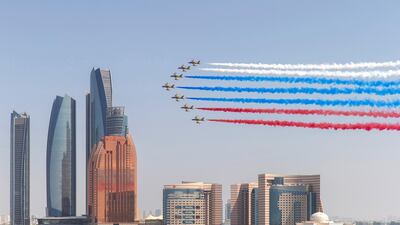The resurgence of Russian influence in the Middle East in recent years was highlighted by president Vladimir Putin's visits last week to Saudi Arabia and the UAE. Moscow and Riyadh are at a fairly early stage of building a new relationship. But the UAE-Russia connection is developing into a mature and strikingly extensive partnership.
And it is not just in the Gulf that Russia is extending its regional clout. Along with its strong alliance with Iran, Moscow is the key backer of Syrian President Bashar Al Assad. Russia also enjoys much closer ties to Israel than it ever has during any previous era, with Israeli Prime Minister Benjamin Netanyahu visiting Moscow more than Washington these days. Russia also has strained but important relations with Turkey, despite continued tensions over Syria. In short, everyone in the Middle East wants to talk to Moscow, a sharp contrast to just a few years ago.
For decades, Washington was the decisive outside power in the Middle East, holding sway over all parties and often serving the kind of balancing and mediating role that many now look to from Moscow.
It is a stunning reversal of the ascendancy Washington secured at Moscow’s expense in 1973, through the outcome and immediate aftermath of the Arab-Israeli war. That was arguably the deftest manoeuvre during Henry Kissinger’s stewardship of US foreign policy and it had massive ramifications for decades that are only now fading into history.
By closely managing Washington’s handling of the crisis, Mr Kissinger and his diplomats achieved three key goals.
Firstly, as Mr Kissinger wanted, Israel prevailed but emerged chastened, with a new sense of vulnerability and dependence on Washington. Secondly, Arab states did not win yet felt vindicated, especially Egypt, whose army performed far better at the outset of the war than expected.
This made a deal possible on both sides. Israel saw the need for territorial compromise. And Egypt had to accept that recovering territory lost in 1967 required an agreement, yet it experienced a restoration of national morale sufficient to allow concessions to Israel. The Egyptian-Israeli peace treaty was conceived in the womb of time.
But Mr Kissinger’s third and most important achievement was manoeuvring during and immediately after the fighting to ensure that Washington and not Moscow played the key role at every stage. As the dust settled, all parties – with the exception of Syria and the Palestine Liberation Organisation (both of which eventually came round) – determined to deal with and through the US, not Russia.
From then on, Russia's influence steadily dwindled in the Middle East – until recently, that is.
Moscow’s resurgence in recent years has been inversely proportional to a US decline. It is linked not to military or economic power but to will and engagement. In several key ways, Moscow also benefits from merely not being Washington.
The story of declining confidence in the US by regional actors and the aversion to Middle East engagement by much of the US public and many politicians is a familiar tale.
It largely begins with the failure in Israeli-Palestinian negotiations and the outbreak of the second intifada in 2000. The 2003 Iraq invasion and the myriad missteps of the Barack Obama administration led to a conscious sense of a broad US drawdown with strong public backing.
Now US President Donald Trump has added caprice and unpredictability to the mix. His betrayal of the Syrian Democratic Forces has firmly cemented the impression that the US is an unreliable partner.
The resurgence of isolationist sentiments on both the political right and left in the US makes a dramatic reversal of this impression hard to imagine. Russia, by contrast, appears steadfast, loyal and tough in defence of its friends.
On paper, however, there is no parity between the two powers. The US has at least 50,000 troops and significantly more weapons, intelligence, infrastructure and other assets in the region than Russia.
The situation is even more imbalanced when it comes to trade. Russia’s main significance for many Middle Eastern countries centres on oil and energy pricing and production. The US, by contrast, is a major power in almost all sectors.
Russia is often used as a foil to pressure the US into co-operating, as when some countries have threatened to buy its S-400 anti-missile system, when what they really want is an American system that Washington is withholding.
Yet Moscow has regained the will to engage and influence the Middle East, just as Washington has lost it. Moscow might be a shadow of Washington but, as the thinking now goes, it at least fights what it wants.
In the diplomatic realm, Moscow now clearly wields superior effectiveness, having developed contacts with all parties and an ability to mediate, balance and help shape, rather than trying in vain to impose outcomes. Predictability and reliability, it emerges, are invaluable assets.
By pursuing limited goals with limited means and its interests with determination, Russia has returned to a major – and sometimes key – role in the Middle East. The US, by contrast, often lacks a consensus about what its aims and interests are, let alone how best to secure them.
From now on, though, Mr Putin might well begin to discover that some necessary tasks in the Middle East cannot be accomplished with limited means. Defeating with the disparate, fragmented Syrian opposition was not a major challenge. Other military and diplomatic aims won’t be the same. As Russia re-emerges as a Middle East power in its own right, it might find itself hard pressed to deliver what many of its new friends are hoping for.
Hussein Ibish is a senior resident scholar at the Arab Gulf States Institute in Washington


